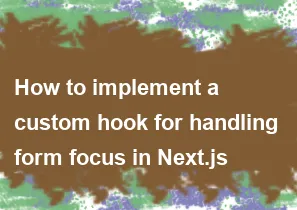How to implement a custom hook for handling form focus in Next.js

To implement a custom hook for handling form focus in Next.js, you can follow these steps:
Create the custom hook: First, create a custom hook that handles the logic for focusing on form elements.
Use the custom hook in your components: Implement the custom hook in your Next.js components where you need to manage form focus.
Here's an example implementation:
javascript// useFocus.js
import { useEffect, useRef } from 'react';
const useFocus = () => {
const ref = useRef(null);
useEffect(() => {
if (ref.current) {
ref.current.focus();
}
}, []);
return ref;
};
export default useFocus;
In this custom hook (useFocus.js), we use the useRef hook to create a reference to a DOM element. Then, we use the useEffect hook to focus on the element when the component mounts.
Now, let's see how you can use this custom hook in your Next.js component:
javascript// MyFormComponent.js
import React from 'react';
import useFocus from './useFocus'; // Import the custom hook
const MyFormComponent = () => {
const inputRef = useFocus(); // Using the custom hook to focus on input
return (
<form>
<label>
Name:
<input ref={inputRef} type="text" />
</label>
<button type="submit">Submit</button>
</form>
);
};
export default MyFormComponent;
In this example (MyFormComponent.js), we import the useFocus custom hook and call it to get a reference to an input element. We then use this reference with the ref attribute in the input element, allowing the input to receive focus when the component mounts.
Now, whenever MyFormComponent is rendered, the input field will automatically receive focus, simplifying the user experience when interacting with forms in your Next.js application.
-
Popular Post
- How to optimize for Google's About This Result feature for local businesses
- How to implement multi-language support in an Express.js application
- How to handle and optimize for changes in mobile search behavior
- How to handle CORS in a Node.js application
- How to use Vue.js with a UI framework (e.g., Vuetify, Element UI)
- How to configure Laravel Telescope for monitoring and profiling API requests
- How to create a command-line tool using the Commander.js library in Node.js
- How to implement code splitting in a React.js application
- How to use the AWS SDK for Node.js to interact with various AWS services
- How to use the Node.js Stream API for efficient data processing
- How to implement a cookie parser middleware in Node.js
- How to implement WebSockets for real-time communication in React
-
Latest Post
- How to implement a dynamic form with dynamic field styling based on user input in Next.js
- How to create a custom hook for handling user interactions with the browser's device motion in Next.js
- How to create a custom hook for handling user interactions with the browser's battery status in Next.js
- How to implement a dynamic form with dynamic field visibility based on user input in Next.js
- How to implement a dynamic form with real-time collaboration features in Next.js
- How to create a custom hook for handling user interactions with the browser's media devices in Next.js
- How to use the useSWRInfinite hook for paginating data with a custom loading indicator in Next.js
- How to create a custom hook for handling user interactions with the browser's network status in Next.js
- How to create a custom hook for handling user interactions with the browser's location in Next.js
- How to implement a dynamic form with multi-language support in Next.js
- How to create a custom hook for handling user interactions with the browser's ambient light sensor in Next.js
- How to use the useHover hook for creating interactive image zoom effects in Next.js